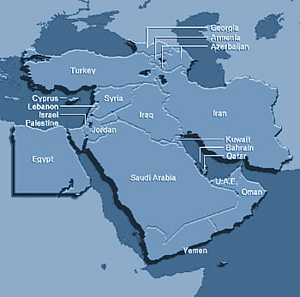The Middle East Opens its Gates For Russia

In the post-Soviet era, the United States could roam across the world freely. Occupying Iraq to relieve the world from the threat of Saddam Hussein’s never-proven WMDs, and invading Afghanistan to topple the Taliban –itself the brainchild of the United States and Pakistan’s intelligence service- were also pretexts for a U.S. hunger to extend its hegemony across the globe.
Russia has now risen from the ashes –mostly thanks to Vladimir Putin- and its new approach toward Latin America and the Middle East has revived hopes that once again, the conflict of interests between Russia and the United States might give breathing room to those countries that refuse to fall under U.S. domination.
World powers of course never sacrifice their interests –or even their rival’s interests- for the sake of smaller and less-powerful countries. Nevertheless, it is the battle of interests in many strategic regions that forces them to compromise, and gives those smaller countries further maneuverability.
During the Cold War, the zero-sum game and popularity of the ideology of the left in the Middle East paved the way for Moscow’s high-profile presence. The dissolution of the Soviet Union, however, landed a heavy blow on the left’s ideology and power relations in the Middle East. Realignment and redefinition of these relations—apart from the (low-key) presence of elements of the left who look to Russia as an ally in their fight against U.S. influence—has paved the way for Moscow’s return to the region.
Moreover, in the post-Cold War era, Russia’s traditional opponents in the region -Turkey, Saudi Arabia and Jordan- have aimed for expansion of bilateral ties to meet mutual needs and to balance their relations vis-à-vis the West –particularly the United States. An influential state like Iran, although aware that the Russians are not necessarily reliable friends, has also let Russia in on Middle East power relations in order to defuse U.S. pressure on itself (and on the Middle East in general).
In the early post-breakdown years, Russian leaders concentrated their political efforts mainly on domestic reconstruction. Then, after relative relief from the critical internal situation, Moscow first started reconstructing its relations with its periphery. Within ten years, Russia redefined its interests in the Caucasus, Central Asia, and Ukraine to revive and reinforce their regional influence.
On its return to the international stage, however, Moscow could not overlook the glow of the Middle East on the world map. As the most strategic geopolitical and geo-economic region in the world, the Middle East has long had Russia and all other global actors drooling.
Medvedev’s recent visits to Turkey and Syria now take on deeper significance as Moscow’s most serious steps in a return to this region. In Damascus, Medvedev warned of deteriorating conditions in the Middle East and called for Israel’s withdrawal from the Golan Heights.
In Turkey, Moscow and Ankara agreed to boost trade volume up to 100 billion dollars in five years, construct nuclear power plants, reinforce energy cooperation and annul the visa regime. Even now, trade exchange volume between Russia and Turkey has exceeded thirty-five billion dollars and Russia is Turkey’s –a NATO member no less- true trade partner.
Moscow’s military, energy, and nuclear technology have attracted the attention of Middle East states the most, paving the way for Russia’s engagement with Middle Eastern political affairs. Aware of this fact, Russia wields its capabilities efficiently and expeditiously to regulate relations with Middle Eastern countries. The construction of nuclear power plants in Turkey, Egypt, and Jordan will be just the initial steps in cementing those relations.
The Middle East has opened its gates to Russia, primarily to balance relations with the United States, and future trends will reveal to what extent regional states can count on Russia’s partnership. In the early years of the third millennium, Moscow is facing a golden opportunity (or is it a tough challenge?) whose outcome will permanently affect its diplomacy.

